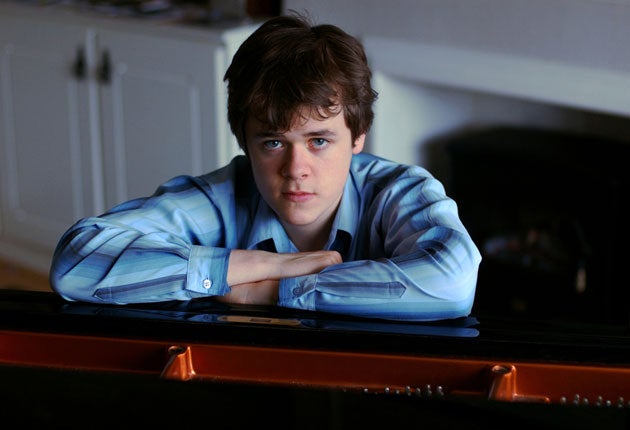Wrong pieces played in concert halls, says Proms new young star

Your support helps us to tell the story
From reproductive rights to climate change to Big Tech, The Independent is on the ground when the story is developing. Whether it's investigating the financials of Elon Musk's pro-Trump PAC or producing our latest documentary, 'The A Word', which shines a light on the American women fighting for reproductive rights, we know how important it is to parse out the facts from the messaging.
At such a critical moment in US history, we need reporters on the ground. Your donation allows us to keep sending journalists to speak to both sides of the story.
The Independent is trusted by Americans across the entire political spectrum. And unlike many other quality news outlets, we choose not to lock Americans out of our reporting and analysis with paywalls. We believe quality journalism should be available to everyone, paid for by those who can afford it.
Your support makes all the difference.Benjamin Grosvenor, a one-time child prodigy pianist who is set to be the youngest soloist to perform at the First Night of the Proms, has launched a stunning attack on his musical elders for promoting "shameful and uninteresting" repertoires at concert halls across the country.
The 18-year-old attacked major classical music venues for relying on popular, predictable composers instead of rarer artists who might broaden the public's horizons. Venues such as London's Southbank Centre and the Symphony Hall in Birmingham regularly feature populist composers such as Chopin and Schumann. The musician will play Liszt's Second Piano Concerto, itself something of a crowd-pleaser, on 15 July at the Royal Albert Hall to open the Proms, the biggest event in the classical music calendar.
He said: "I think it's important to broaden people's horizons. There are a number of concertos which people want to hear and they all appear in concert programmes. But there is so much more out there, and it is a shame that it is not often explored.
"I want to play the music I want to play," he added. "I think reaching a larger audience for classical music is terribly important. Does popularising classical music mean confining yourself to a certain repertoire? "
He pointed to 19th-century contemporaries of Liszt, such as the Swedish composer Wilhelm Stenhammar, as having created more challenging works which are "never programmed" because "orchestras are afraid that audiences will react badly to them and people aren't going to come". Grosvenor has highlighted a continuing debate between those who feel that popular works are challenging and those who find them predictable.
"I agree with him. I feel the major concert halls are so afraid of being adventurous," said Jeremy Nicholas, a critic for Gramophone magazine. "We stick to the same two Chopins, Schumann, Tchaikovsky piano concerto No 1 and a bit of Brahms, and that's it. There are huge numbers of melodic concertos which general music lovers might not have heard of, exciting stuff that might blow the lid off the Royal Albert Hall if promoters put it on."
Not everyone believes the fault lies with the pieces being played. "I think it's always a challenge," said Royal Academy of Music professor Bryce Morrison. "Chopin's concertos are always a challenge; he should view them as a challenge. Things are going wonderfully for Benjamin, but I disagree strongly. I think if something sounds over-familiar, there's something wrong with the performance."
A spokesperson for London’s Southbank Centre, one of London’s main venues for classical music, said it programmed significant amounts of Chopin last year, due to the 200th anniversary of the composer’s birth, and also because “Chopin is one of the greatest and most prolific composers of piano music”, though also highlighted the wide variety of other composers’ work it offered.
In April, Grosvenor signed to classical music label Decca Classics, the youngest ever musician to do so.
Join our commenting forum
Join thought-provoking conversations, follow other Independent readers and see their replies
Comments